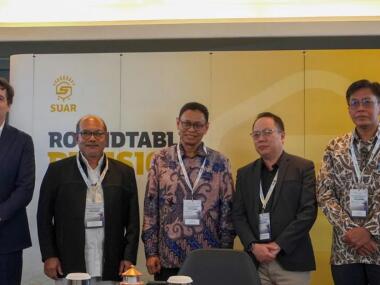Jakarta, 15 January 2021 – The ongoing pandemic is now past its 35thweek, a prolonged calamity that the world was never been prepared to face. It did not only force changes in our daily activities but it has also forced us to forsake direct face-to-face interaction for virtual, online interaction instead. The media and their journalists are no exception, and they have had to follow suit.
The Indonesian media is at present in a precarious condition. In the past few years, media companies have had to bear the relentless pressure coming from its online rivals. The online culture not only modified the behavior of readers in general but it also affected the income of journalists. A pressure that was further exacerbated by the presence in the market of internet-based websites that could be accessed for free.
The pressure also did not stop there. The pandemic only reinforced what most media companies in Indonesia, including large established one such as Kompas, have feared so far.
Kompas Gramedia Group CEO Andy Budiman said that the readership of the online platform of Kompas had increased by 124 percent in just one year. But this increase did not come with a commensurate rise in media company revenues, especially since many of the print media were already suffering from a drop in circulation and revenues, because of the digital disruption. Paulus Tri Agung Kristianto, Deputy-Editor-in –Chief of Kompas daily said that COVID-19 had only made the decline in the daily’s circulation worst. There were even cases where readers simply worried that they could get infected by the Corona virus just by getting in contact with the printed newspaper.
Despite of the intensive campaign conducted by the Kompas daily editorial team to dismiss that particular fear, the fact remained the number of readers failed to rise significantly.
Print media and the other conventional media were now forced to continuously rack their brain to find revenues. In the case of Kompas daily, they have since 2017 tried to distribute their e- through Kompas.id but the efforts remained unable to cover even the operational costs. The print media, therefore, had to continue to depend on advertisement for revenue. Unfortunately, because of the pandemic, many companies had to also slash their advertisement and promotion funds.
The specter of the online media robbing their print counterparts of their readership also began to turn real. On October 1, Indonesia’s leading English-language media The Jakarta Post had to terminate the employment of up to 70 percent of its personnel. A sad news from the journalistic world in Indonesia in this time of pandemic.
This nightmare has been taking its toll on all kinds of media and undermined the idealism, independence and quality of Indonesian media. Many have been protesting against what they saw as the deteriorating quality of journalism, that they deem was increasingly straying away from the principles of good journalism and tended to increasingly turn into clickbait journalism with contents that did not warrant reporting.
This all took place as the media had to struggle to survive amid the mounting uncertainty. They have had to face the challenge of coming out with content that must interest readers, and also advertisers, in order for their operation to survive. More often than not, they lose and produce contents that were not up to standards.
This indirectly affected the communication industry. Media companies are producing a variety of media product catering to different readers. But at present, all media appeared to increasingly come out with similar contents in the online scene. Meanwhile, the print media had to fight hard to survive in the face of competition from the online media.
But this does not mean that nothing could be done to help save the print media from extinction amid the current conditions. A number of media have put up paywalls for the entirety or part of their production. By contributing funds in return for journalistic products, you actually would have already contributed to efforts to help the media maintain quality journalistic content.The media could not stand alone, on their own. We depend on the media to relay the opinion of the public and provide of voice for the society. And now, they need our help, help from the public, so that they could continue to relay messages in an honest and independent manner.






